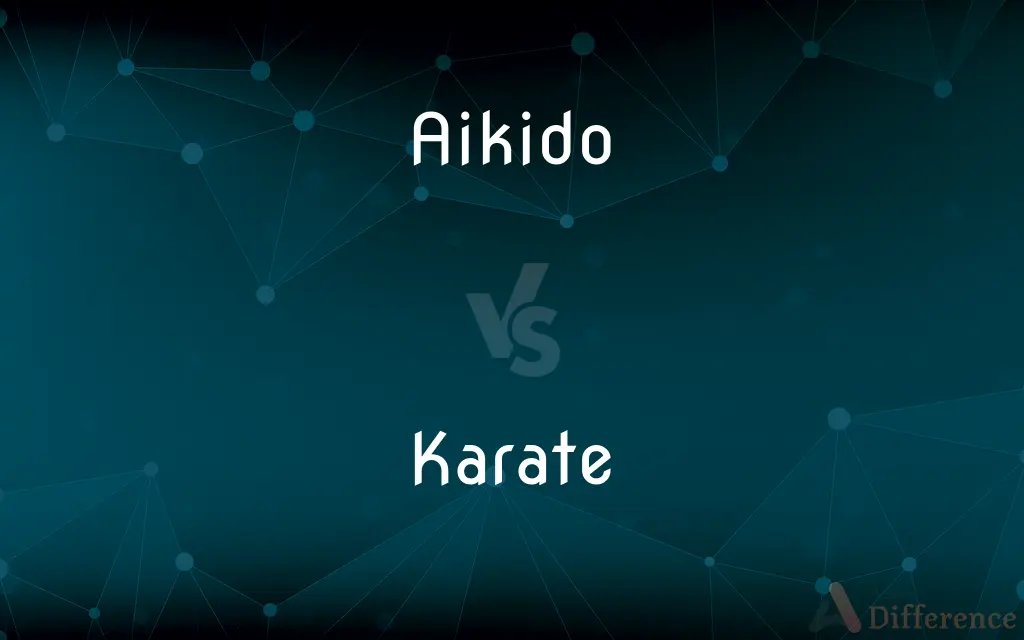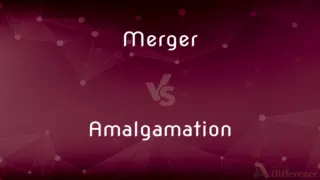Aikido vs. Karate — What's the Difference?
By Tayyaba Rehman — Updated on September 21, 2023
Aikido is a Japanese martial art focusing on harmony and redirecting an opponent's energy, while Karate emphasizes striking techniques. Both are forms of self-defense but differ in philosophy and execution.

Difference Between Aikido and Karate
Table of Contents
ADVERTISEMENT
Key Differences
Aikido and Karate are both revered Japanese martial arts, but their origins, techniques, and philosophies markedly differ. Aikido, which means "the way of harmony with the spirit," prioritizes blending with and redirecting an opponent's force. In contrast, Karate, translating to "empty hand," predominantly emphasizes punching, kicking, and striking.
While Aikido uses the energy of the opponent to neutralize threats, Karate seeks to overpower adversaries with direct force. Aikido often involves joint locks and throws, leveraging the opponent's movements. Conversely, Karate training encompasses kata, which are choreographed patterns of movements, and kumite, a form of sparring.
Though both martial arts teach discipline and respect, Aikido is more about harmonizing with an opponent, while Karate centers on offensive and defensive techniques.
Comparison Chart
Philosophy
Emphasizes harmony and redirection.
Focuses on striking with power.
Techniques
Uses opponent's energy, involves joint locks and throws.
Emphasizes punches, kicks, and strikes.
ADVERTISEMENT
Origin
Developed in the early 20th century.
Has roots in ancient Okinawan fighting styles.
Main Proponents
Morihei Ueshiba
Gichin Funakoshi, Mas Oyama.
Training Components
Ukemi (rolling), Nage (throwing techniques).
Kata (patterns of moves), Kumite (sparring), and Kihon (basic techniques).
Compare with Definitions
Aikido
A non-competitive martial art.
Unlike some other martial arts, Aikido doesn't have tournaments or sparring sessions.
Karate
Uses kata for pattern practice.
Every Karate practitioner learns various kata as part of their training.
Aikido
A martial art prioritizing harmony and balance.
She practiced Aikido to find a connection between mind and body.
Karate
Prioritizes discipline, respect, and self-control.
Karate is not just about fighting; it's about mastering oneself.
Aikido
Uses an opponent's force against them.
In Aikido, redirecting an attack is more common than countering with a strike.
Karate
A striking-based martial art from Okinawa, Japan.
She earned her black belt in Karate after years of dedication.
Aikido
Focuses on spiritual growth and self-improvement.
For him, Aikido was not just physical training but also a spiritual journey.
Karate
Emphasizes punches, kicks, and knee strikes.
His Karate training was evident in the precision of his kicks.
Aikido
Emphasizes fluidity and circular movements.
The Aikido techniques he demonstrated flowed seamlessly from one to the next.
Karate
Often involves sparring for practical experience.
In his Karate class, sparring sessions were both challenging and enlightening.
Aikido
Aikido (Shinjitai: 合気道, Kyūjitai: 合氣道, aikidō, Japanese pronunciation: [aikiꜜdoː]), is a modern Japanese martial art that is split into many different styles, including Iwama Ryu, Iwama Shin Shin Aiki Shuren Kai, Shodokan Aikido, Yoshinkan, Aikikai and Ki Aikido. Aikido is now practiced in around 140 countries.
Karate
Karate (空手) (; Japanese pronunciation: [kaɾate] (listen); Okinawan pronunciation: [kaɽati]) is a martial art developed in the Ryukyu Kingdom. It developed from the indigenous Ryukyuan martial arts (called te (手), "hand"; tii in Okinawan) under the influence of Kung Fu, particularly Fujian White Crane.
Aikido
A Japanese art of self-defense that employs holds and locks and that uses the principles of nonresistance in order to debilitate the strength of the opponent.
Karate
A Japanese martial art in which sharp blows and kicks are administered to pressure-sensitive points on the body of an opponent.
Aikido
(uncountable) A Japanese martial art developed from jujitsu and making use of holds and throws.
Karate
An Okinawan martial art involving primarily punching and kicking, but additionally, advanced throws, arm bars, grappling and all means of fighting.
Aikido
(countable) A school of the martial art.
Karate
To attack (somebody or something) with karate or similar techniques.
Aikido
A Japanese martial art employing principles similar to judo
Karate
A traditional Japanese system of unarmed combat; sharp blows and kicks are given to pressure-sensitive points on the body of the opponent.
Karate
A traditional Japanese system of unarmed combat; sharp blows and kicks are given to pressure-sensitive points on the body of the opponent
Common Curiosities
Are there competitions in Aikido like in Karate?
No, Aikido is generally non-competitive, whereas Karate often has tournaments.
Is Aikido more defensive than Karate?
Yes, Aikido emphasizes blending with and redirecting an opponent's attack, while Karate focuses on both offense and defense.
Which martial art has the philosophy of "the way of harmony with the spirit"?
That philosophy belongs to Aikido.
Is Aikido popular worldwide like Karate?
While Aikido is practiced worldwide, Karate is more widely recognized and practiced.
Which martial art is older: Aikido or Karate?
Karate has ancient roots in Okinawan fighting styles, while Aikido was developed in the early 20th century.
Do both Aikido and Karate practitioners wear belts to signify rank?
Yes, both martial arts use belt systems to indicate a practitioner's rank and experience.
Which martial art has kata: Aikido or Karate?
Karate has kata, which are choreographed patterns of movements.
Is Karate only about fighting?
No, Karate also emphasizes discipline, respect, and self-improvement.
Can Karate be used for self-defense?
Yes, Karate is a practical martial art that can be effectively used for self-defense.
Are weapons used in Aikido training?
Yes, Aikido training can include traditional weapons like the jo (staff), bokken (wooden sword), and tanto (knife).
How physically demanding is Aikido compared to Karate?
Both can be physically demanding, but in different ways. Aikido often involves fluid movements and falls, while Karate involves strong, impactful strikes.
What's the meaning of "Karate"?
Karate translates to "empty hand," indicating its nature as a weaponless martial art.
Share Your Discovery

Previous Comparison
Love vs. Respect
Next Comparison
Merger vs. AmalgamationAuthor Spotlight
Written by
Tayyaba RehmanTayyaba Rehman is a distinguished writer, currently serving as a primary contributor to askdifference.com. As a researcher in semantics and etymology, Tayyaba's passion for the complexity of languages and their distinctions has found a perfect home on the platform. Tayyaba delves into the intricacies of language, distinguishing between commonly confused words and phrases, thereby providing clarity for readers worldwide.














































